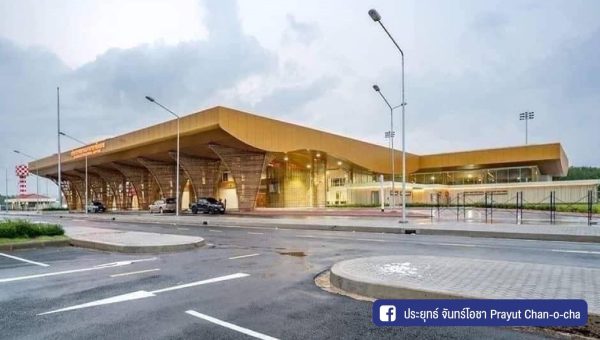Thailand’s Prime Minister Prayut Chan-o-cha has a specific fixation with “innovation.” His authorities has positioned a excessive precedence on upgrading infrastructure in all dimensions – air, land, and sea – to bolster the nation’s long-term financial progress. This 12 months alone, however the big budgetary strain exacerbated by the COVID-19 pandemic, the Prayut authorities has allotted a 1.4 trillion baht price range for 13 current and 24 new transport infrastructure initiatives. This consists of elements of the much-delayed high-speed rail undertaking connecting Thailand to China through Laos.
As a part of the air infrastructure growth, the federal government invested 1.9 billion baht to construct a brand-new worldwide airport in Betong district of Yala province in Thailand’s predominantly Malay-Muslim southern border area. The airport’s development on roughly 360 acres of land started in 2017. After a number of delays, the power was formally opened on March 14 of this 12 months.
Betong airport, as highlighted on Prayut’s official Fb web page, is meant to be “extra than simply an airport.” It’s presupposed to open a door of alternative for the three impoverished southernmost provinces of Pattani, Yala, and Narathiwat, which have been caught in financial stagnation because the escalation of the greater than a century-old ethno-religious battle in 2004. There may be already one current airport for industrial use in Narathiwat. Nonetheless, given the area’s mountainous terrain and curvy roads, it’s fairly time-consuming to journey from Narathiwat to the opposite two provinces. Having one other airport within the Thai border district of Betong would thus improve the Deep South’s connectivity with the remainder of Thailand and neighboring ASEAN nations.
Betong is arguably probably the most very best vacationer vacation spot within the Deep South, because of its distinctive delicacies, lengthy historical past of multiculturalism, pure wonders, and iconic landmarks, together with Southeast Asia’s longest skywalk. The Prayut authorities has characterised Betong as a “tourism mannequin metropolis” underneath the nationwide growth plan to revitalize the insurgency-wrecked area. If the peace talks between the Thai authorities and probably the most highly effective rebel group, Barisan Revolusi Nasional (BRN), proceed nicely with out interruptions, it’s anticipated that extra Thai and Southeast Asian travellers will come to Betong. The warfare in Europe and rising journey prices within the post-pandemic world (together with COVID testing and insurance coverage charges in addition to costly airfares) will additional discourage folks from travelling to long-distance locations, however Thailand is hopping to draw guests from its neighboring nations.
Along with elevated vacationer arrivals, cross-border buying and selling in step with the Indonesia-Malaysia-Thailand Development Triangle (IMT-GT) cooperation is anticipated to develop. In the end, financial progress in Betong will profit the Deep South area as an entire. This, in the long term, will assist alleviate native grievances and create a way of belonging among the many marginalized Malay-Muslim inhabitants, thereby reducing native assist for the insurgents.
All of it sounds very promising, till the practicalities are mentioned. The troubled actuality is that Betong airport has a brief (1,800 meters) and slender (30 m) runway, making it solely accessible to ATR-72 or Q400 turboprop aircrafts. To make issues worse, Betong airport just isn’t outfitted with a gasoline station, which means that turboprop planes flying from Bangkok must both cease at one other airport on the way in which to high up gasoline or carry their very own gasoline tanks on board, which is able to decrease the variety of seats out there. In any case, airways don’t have any alternative however to considerably mark up their air tickets to take care of profitability, which clearly won’t promote nicely. This explains why the low-cost Nok Air abruptly cancelled its Bangkok-Betong flights indefinitely simply two days after the airport’s grand opening. With out authorities subsidies, it will be extraordinarily troublesome to get airways so as to add Betong to their route community.
The foreseeable issues above, along with experiences by a number of Thai media retailers – Bangkokbiznews, Nation On-line, and Thansettakij – that Betong airport lacks ample funding to cowl the operational prices are in stark distinction to the airport’s fancy bamboo-crafted design. That imbalance has make clear the Thai authorities’s overemphasis on look and raised corruption issues.
And, basically, peace is a prerequisite for financial growth. So long as the Deep South is perceived to be unsafe, most individuals can be reluctant to journey there, no matter accessibility. Simply final week, in opposition to the backdrop of the Thai authorities and the BRN’s Ramadan ceasefire settlement, bomb blasts killed a fisherman and injured three explosive ordnance disposal officers in Pattani. An armed unit of the Patani United Liberation Group (PULO), which has been excluded from the peace talks, was behind the assault. This newest violence exposes the fragility of the peace course of within the Deep South. Until there’s a main narrative change to be extra inclusive, construct extra belief, and present extra willingness to compromise on all sides, a peaceable decision to the battle within the Deep South is off the desk.
At this cut-off date, it’s nonetheless too early to dismiss the importance of Betong airport. Significant actions must wait till the entire elimination of COVID-19 border restrictions. That mentioned, it’s clear that the airport’s fortunes will relaxation upon the Thai authorities’s means to handle lingering operational challenges and the course of the peace talks.

